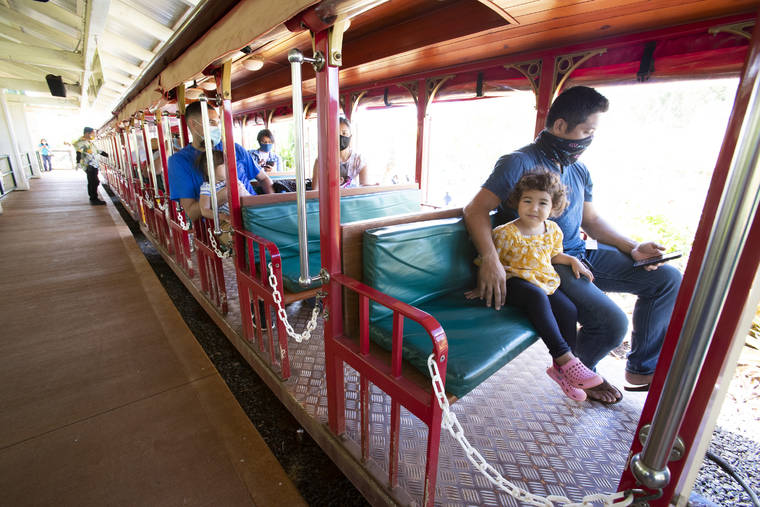State Health Department, CDC offer guidance on Thanksgiving celebrations, warn against superspreader events

CINDY ELLEN RUSSELL / CRUSSELL@STARADVERTISER.COM
Geary Udagawa spent time with his daughter Sonder, 2, aboard the socially distanced Pineapple Express Train at Dole Plantation.
As the holiday season approaches, the Hawaii Department of Health offers a practical guide for a safe way to Opens in a new tabcelebrate Opens in a new tab and avoiding superspreader events with friends and family.
Although holidays in Hawaii are a time to welcome home family members who have been away at school or host visiting friends, these festivities are among the highest-risk scenarios for transmitting COVID-19, the department said. The department also reminds Hawaii residents that it’s important to keep everyone safe, especially vulnerable family members, and to avoid overburdening health care professionals and hospitals during the flu season.
“We will soon enter six weeks of the holiday season, between Thanksgiving and New Year’s, said Dr. Elizabeth Char, director of health, in a statement. “If we celebrate as we always have, Hawaii will see another dangerous rise in cases. We must avoid ‘superspreader’ events, especially if infection rates and case counts surge in our state. We all need to remain vigilant to protect our island home by avoiding large indoor gatherings, dinners or parties.”
The U.S. Centers for Disease Control says the safest way to celebrate Thanksgiving Opens in a new tab this year is to celebrate with people in your household.
The state Health Department recommends paying close attention to the number and rate of COVID-19 cases on your island or community to determine whether you should hold a holiday gathering.
You may want to opt for smaller holiday gatherings, limited to people who live in the same household, or host a virtual gathering, which poses a low risk of spreading the virus while allowing you to stay connected.
Don't miss out on what's happening!
Stay in touch with breaking news, as it happens, conveniently in your email inbox. It's FREE!
“Opting for virtual gatherings, saying ‘no’ to invites to in-person parties, and finding creative alternatives to show we care about our loved ones is a must,” said Char. “It is everyone’s kuleana to celebrate safely with family, friends and community.”
Some alternatives include preparing favorite recipes for non-household family members and neighbors, and delivering them without contact.
Also, the department recommends shopping online rather than in person on Black Friday the day after Thanksgiving, or on Cyber Monday. Watch sports events, parades, and movies from home.
The state Health Department offered the following general guidance for in-person holiday gatherings:
>> Be responsible: First of all, it is important to not host or participate in any in-person festivities if you or anyone in your household has COVID-19 symptoms, is waiting on test results, may have been exposed (basically anyone subject to quarantine), has been diagnosed with COVID-19 and has not met the criteria for when it is safe to be around others, or is at increased risk of severe illness from COVID-19.
>> Location: Indoor gatherings generally pose more risk than outdoor gatherings. Indoor gatherings with poor ventilation pose more risk than those with good ventilation. Plan for outdoor events or leave doors and windows open.
>> Duration: The longer the event, the more risk of exposure. Consider having shorter celebrations.
>> Number of invitees: Gatherings with more people pose more risk than those with fewer people. The size of a holiday gathering should be based on the ability to reduce or limit contact between attendees and the risk of spread between attendees. Keep a distance of at least 6 feet apart from those who are not from the same household.
>> Out-of-state guests: A negative pre-travel COVID-19 test from trusted testing and travel partners or an FDA-approved test after arrival with the required quarantine helps reduce spread in the islands. Still, gatherings with attendees from outside Hawaii may pose a higher risk than gatherings with attendees who live in the same area.
>> Behaviors: Gatherings with attendees who do not engage in preventive behaviors such as maintaining a physical distance of least 6 feet, wearing masks, or washing hands often pose more risk than gatherings with attendees who follow preventive behaviors.
Dr. Anthony Fauci, the nation’s top infectious disease expert, also recommends masking up at Thanksgiving gatherings Opens in a new tab, even if it’s a very small gathering, particularly if the coronavirus status of others is unknown.
The CDC recommends wearing a mask with two or more layers over your nose and mouth, staying at least 6 feet away from others who do not live with you, washing your hands often, and bringing your own food, drinks, plates, cups and utensils.
If celebrating indoors, make sure to open windows, limit the number of people in food preparation areas, and clean and disinfect frequently touched surfaces and items between each use. If sharing food, it is ideal to have one person serve the food.



